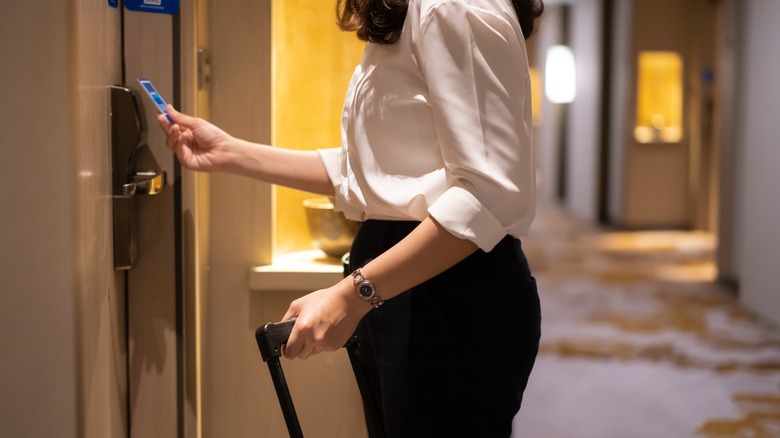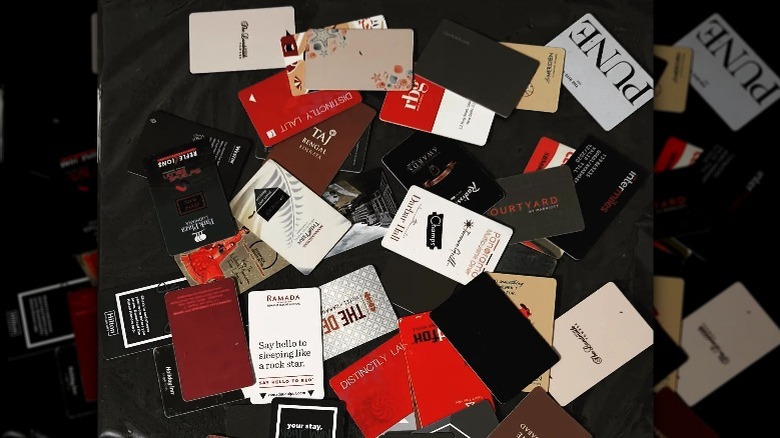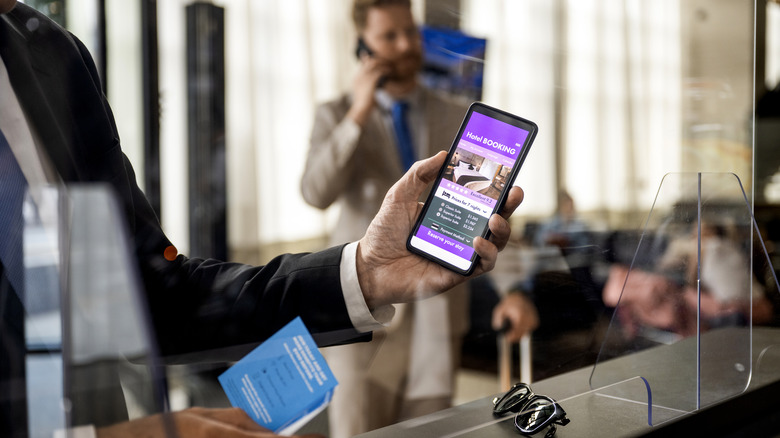Answers To Those Random Questions You've Had About Hotel Keycards
When we check in to a hotel, we're always careful not to do anything that might get us kicked out. But, of course we all like to take small bathroom amenities as souvenirs. However, the full hotel experience wouldn't be complete without the rectangular piece of plastic that the front desk hands out upon check in. This is, of course, your key card.
Hotel keycards come in various designs unique to the hotel or chain or brand. It's like a business card that's distinct and easily identifiable as this or that hotel. You'll need it to access your room and it provides a measure of security during your stay.
But what happens if you fail to return your key card? Or, perhaps you're wondering how long hotels will continue to use them? Or, if hotels ever re-use their key cards. These (and, hopefully, a few more) of your random questions about hotel key cards are answered below.
What kind of info is stored on hotel key cards?
Back in 2003, a cautionary email about key cards storing the personal information of hotel guests flooded the inboxes of many people, per the fact-checking website Snopes. According to the circulating messages, hotel key cards stored not only your room number, check-in and check-out dates but also your name, home address, and credit card number. But, is there any truth to this or is this just an urban legend?
Both ComputerWorld and USA Today investigated the claims in 2006 and 2017, respectively, and both came to the same conclusion: U.S. hotel key cards don't store your personal information whatsoever. Then, what kind of data do they store? Only three pieces of information: your room number, your check in and departure dates, and a guest number or guest account code.
"For a hotel key card, it should only have the data on it that it needs to do its job. For example a time stamp, so if you're in the room from Monday to Thursday and you try to use that key on Friday, it doesn't work," Steve Grobman, McAfee's chief technology officer, told USA Today. Obviously, the room number tells the key card which door to open and lock. The time stamp or schedule tells it when it should start and stop doing these actions. And, the guest number or account code — not your name — is used to charge your account for any goods or services you purchased during your stay.
Do hotels re-use key cards?
Yes, hotels re-use keycards, but they'll need your cooperation to do it. Here's how it works: First, hotels have return boxes where you can drop your key cards prior to leaving the premises. Before they can be re-used, however, the key cards are wiped clean of data. Afterward, they are reprogrammed with information for the next hotel guest who will use it. Again, only the following information are encoded into key cards: room number, check-in and departure dates, and a guest number or code.
As long as guests continue to return their key cards and they're in good condition, hotels can do this process over and over again because plastic key cards are made of strong material and can last for a very long time. According to Christopher Balch of Maglocks, a manufacturer and distributor of card access control systems (via USA Today), "They're reusable to the point where we offer a lifetime warranty."
Can you keep the key card after you check out?
A survey conducted by The Points Guy asking if people kept their key cards after checking out of their hotels revealed that some of them do. Out of 3,966 people who responded to the Instagram poll, 39% said they kept their key cards after checking out, while 61% said that they don't do so. Whether you purposely kept your key card as a memento of your travels or you just totally forgot to return it, you can breathe easy. As mentioned, hotels have return boxes for key cards, but as to any specific policy about requiring guests to return them, there doesn't appear to be any.
If hotels aren't strict with regard to the return of their key cards, it's because the cost to replace them is cheap. Maglocks' Christopher Balch told USA Today that plastic key cards only cost from 10 cents for key cards with magnetic stripes to about $1 for those with embedded smart chips.
Will key cards still work if I keep them with my phone?
There are two schools of thought about this issue: One says yes and the other says no. The main argument of the negative side is that key cards will not work if, for some reason, it has become demagnetized. Demagnetization happens when the key card's magnetic field, i.e., its magnetic stripe, comes close to other magnetized items, such as credit cards or phones. When this happens, the data held within the key card is erased and so it stops working. While phones have a weak magnetic field, it is supposedly enough to affect your key card's low magnetic coercivity, or the strength of the key card's magnetic field and its ability to withstand demagnetization.
On the other hand, the affirmative school of thought proposes several reasons why key cards might stop working. Typically, key cards will stop working when the programmed time for it to function ends. That is, if you only book for two days, expect that you won't be able to use the key card on the third day, and you'll need a new one to regain access to your hotel room. So, in general, hotel key cards can be kept in your pocket, in your wallet, in your suitcase, or practically anywhere else, and they'd still be okay. Key cards are pretty durable, but they can only be reprogrammed for a limited number of times. And, make sure the magnetic stripes don't get any form of physical damage, such as scratches, or the key card may also stop working.
How much longer will we be using these?
The shift from key cards to digital room keys is already happening, starting with big name brands, such as Hyatt, Hilton, and Disney. Its main advantage is convenience. You don't have to wait for minutes to receive a plastic key card, as you'll be provided a key digitally and its activation, extension, and expiry all happen digitally as well. It's also highly unlikely that you'll misplace your phone, so there's no need to request a new one from the front desk. And, with most people owning a smartphone and 76% of travelers citing the device as their No. 1 travel accessory, according to an OpenKey poll, digital room keys appear to be the inevitable next step to hotel room access.
However, some hoteliers are worried about removing the human touch that makes a hotel experience special and memorable for guests. Another big disadvantage is the immense amount of investment required. Geraldine Calpin, Hilton's chief marketing officer, told the Financial Times that the company invested over $100 million for its digital key development and installation initiatives and an additional $550 million on technology infrastructure needed to run its digital key across a limited number of hotels. These figures dwarf the monthly average of $1,000 saved from discarded RFID cards (via OpenKey) or $2,000 saved from keycard replacements (per OpenKey). So, while digital room keys might be the future, it looks like it will take some time before hotels everywhere start widely using them.





